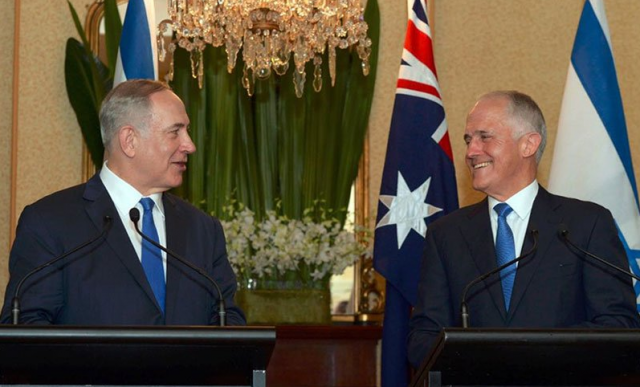

The upper photo was taken at the liberation of the Auschwitz-Birkenau death camp on 27 January 1945. The lower photo, which was taken exactly 60 years later, includes 7 of the survivors in the original photo. One of those survivors, Eva Slonim (6th from left in the upper photo and 4th from left in the lower photo) rebuilt her life in Australia...
Hon Stuart Robert MP, Member for Fadden, Queensland
That this House:
(1) notes that 14 May 2018 is the 70th anniversary of the creation of the modern state of Israel, a seminal event that occurred in 1948, and congratulates Israel on an amazing seventy years of democracy, growth and prosperity;
(2) recognises that 15 July 2018 marks the 80th anniversary of the end of the fateful Évian Conference, convened by President Roosevelt in 1938 in Évian-les-Bains, France, with 31 countries, to discuss the issue of the plight of Jewish refugees fleeing the horror of Nazi persecution;
(3) further notes that:
(a) the Australian Minister for Trade and Customs in 1938, Lieutenant Colonel T.W. White, declined to further assist the Jewish people, stating 'Australia has her own particular difficulties...migration has naturally been predominantly British, and it (is not) desired that this be largely departed from while British settlers are forthcoming. Under the circumstances Australia cannot do more, for it will be appreciated that in a young country manpower from the source from which most of its citizens have sprung is preferred, while undue privileges cannot be given to one particular class of non-British subjects without injustices to others. It will no doubt be appreciated also that as we have no real racial problem, we are not desirous of importing one by encouraging any scheme of large-scale foreign migration...I hope that the conference will find a solution of this tragic world problem';
(b) post Kristallnacht, when the Nazis burned Jewish synagogues, businesses and books, Australia did reassess its policy to admit 15,000 refugees over three years, compared to the previous quota of 1,800 per year;
(c) an estimated 6 million Jews and millions of others died during the Holocaust, exacerbated by the failure of Australia and other nations of the world to more fully protect the Jewish people; and
(d) Lieutenant-Colonel White's statement on behalf of the Government of Australia is still visible at the Yad Vashem Holocaust Memorial in Jerusalem, as a representative response for all other nations' responses of indifference at the Évian Conference;
(4) states that this Parliament, as representative of all political parties and the people of Australia, issues a profound apology and says 'sorry' to the Jewish people for the indifference shown by the Parliament in 1938 that worsened the impact of the Holocaust; and
(5) notes that:
(a) in doing so, we seek to honour the memory of all those who lost their lives in the Holocaust and make right, a great wrong, perpetuated by Australia on the Jewish people;
(b) a request will be made for this motion to be presented to Yad Vashem this 70th year asking that the parliamentary apology be displayed beside Lieutenant-Colonel White's statement of 1938 that he issued on behalf of the Government of Australia; and
(c) this motion will be provided to the Knesset this 70th year, one parliament to another.
Follow this link to Hansard to read the debate and its continuation.




